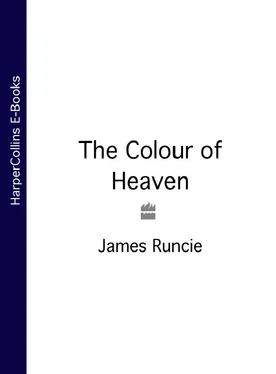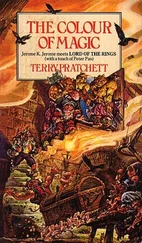Teresa stopped.
Underneath the trees lay six open coffins, each one containing a friar.
Perhaps the island was diseased, and the midges and flies of the wasteland had carried an infection in the air. Had Marco lied and sent her here to die? Was the island deserted? And where was Paolo?
Suddenly, one of the dead friars sat up in his coffin and sang.
‘Praised be my Lord for our sister the moon, and for the stars, the which he has set clear and lovely in heaven.’
Teresa screamed.
A second dead monk sat up.
‘Praised be my Lord for our brother the wind, and for air and clouds, calms and all weather by which thou upholdest life in all creatures.’
Teresa found herself in the middle of a mighty Resurrection, as if Judgment Day had arrived without warning. Each of the monks sat up in turn, arms outstretched, gazing high into the heavens.
‘Praised be my Lord for our sister water, who is very serviceable unto us and humble, and precious, and clean.’
‘Praised be my Lord for our brother fire, through whom thou givest us light in the darkness; and he is bright and pleasant and strong.’
‘Praised be my Lord for our mother the earth, the which doth sustain us and keep us, and bringeth forth divers fruits and flowers of many colours, and grass.’
‘Praise ye and bless the Lord, and give thanks unto him, and serve him with great humility.’
The first monk stepped out of his tomb and walked towards her, looking down at the ground as he did so.
‘Pax et bonum, peace and all good things, sister …’
‘My child …’ Teresa stuttered.
‘Our daily orisons …’ the nearest monk explained, also abandoning his tomb.
‘I am Brother Matteo and that is Brother Filippo.’ He gestured to the first monk.
The remainder now rose from their coffins but none would look her in the eye. Teresa thought they might be blind.
‘Also Brother Giuseppe, Brother Giovanni, Brother Jacopo, and Brother Gentile.’
‘I am Teresa, wife of Marco Fiolaro.’
‘Then you are blessed,’ said Matteo, looking at a patch of ground beneath her feet.
Further silence followed, and the monks stood smiling at the ground as if nothing else need happen.
At last Brother Matteo offered an explanation. ‘We rest to prepare ourselves for the eternal slumber, as our brother Francis did before us.’
‘My child – my husband brought the child …’ Teresa stammered.
‘He is yours?’
‘I know that he came yesterday and that he needs me. He needs me to feed him.’
‘We have provided for him. The milk from Sister Goat, the honey from Brother Bee.’
‘Where is he?’ Teresa asked, desperately trying to encourage them to move, but the monks stood smiling and waiting. Perhaps this was their attempt at eternal life, Teresa reflected. There was no hurry to do anything.
‘I think the child is in the library,’ Matteo affirmed, and the monks all began to speak at once, as if performing a distracted commentary.
‘With Brother Cristoforo.’
‘He is old.’
‘He has rested much in the afternoon.’
‘Time enough in the next world,’ added Giovanni.
‘And yet he is prepared for greater glory.’
‘Sister Death, the Gate of Life.’
Teresa wondered if they were all about to lie down again, as if this encounter had been enough for one day. Perhaps they were waiting for her to do something, or there was some rite of which she was unaware.
‘Would you like to see Brother Cristoforo?’ Matteo asked.
‘He has my son?’
‘We have entrusted him to Cristoforo.’
‘Can I see him? Can I take my baby home?’
‘Rest here a while. Stay with us and pray.’
Teresa’s determination gave her strength to resist. ‘I must see Paolo.’
‘Then follow me.’
They walked up through the olive grove and into the cloisters. Brother Matteo pointed to a step ahead as if warning Teresa not to trip.
‘Be mindful …’
Teresa looked down.
‘Brother Ant.’ A small colony was making its way across the step and the monks waited to let it pass.
At last they reached the door of the library. Matteo pushed it open, and Teresa could see an elderly monk reading, holding a piece of quartz shaped like the lesser segment of a sphere midway between his eyes and a manuscript. At his feet sat a small wooden makeshift cradle. The monk looked up.
‘My child …?’ she asked.
‘You are the mother,’ the monk asserted. There was no sense of a question; it was a matter of fact.
‘I am, Father.’
‘Brother,’ the monk corrected her.
He knelt down and picked up the baby. ‘So short a stay, so happy a child.’
He handed Paolo to Teresa. ‘God grant that you take care, sister.’
Teresa held him, and the surge of love returned. ‘Paolo,’ she said quietly.
Teresa looked up to see all the fellow monks standing in the doorway, their eyes averted. She turned back to Brother Cristoforo.
‘Are they blind?’ she asked.
The old monk laughed. ‘No, not blind. They see very well. But their eyes are fixed on the earth and on the heavens.’
‘Why won’t they look at me?’
‘Our brother Francis scarce knew the features of any woman. He was fearful of his body, Brother Ass. I am too old for temptation, but my brothers’ – he smiled – ‘do not want to rekindle the spark of vanquished flesh.’
‘They are afraid of me …’
‘Not of you, but of temptation.’
‘I am just a mother.’ Teresa almost laughed. ‘I am too old for that. I am nearly thirty.’
‘We have learned to be careful,’ said the monk severely. ‘A man never knows when the lure of flesh might prove unconquerable.’
‘I do not think I pose such a danger.’
The monk waved her away. ‘Lady, do not test us. Let us serve the Lord and save our souls.’
‘I can go?’
‘Take your child, and give thanks.’ Then he made the sign of peace and gave her the blessing of St Francis. ‘Let him walk in the way of the Lord.’

It was a childhood of swamp and fire.
Almost as soon as he could walk, Paolo was apprenticed to the family glassworks, gathering seaweed and samphire on the shores of the island. He collected pebbles for silica in the marshes as his mother cut branches of elm, alder, and willow for fuel.
The furnace burned night and day from November to July. Marco worked bare-chested, blowing and twisting the glass from his bench. Paolo marvelled at the way in which the thick vitreous paste could purify in the flames to become lucid and brilliant. He let his fingers run through the infinitely varied sharpness of the sand, testing its coarseness and consistency. He examined each constituent part, amazed by the softness of the soda, the alchemical quality of red lead, the threat of arsenic. He loved the way in which the glass mixture, the frit, melted and cracked in the heat, becoming as glutinous and foaming as the waters of the lagoon, surging towards him in the furnace, the hottest sea he had ever seen.
As he grew older Paolo would arrange glass by colour, and visit the mosaicists at work in the churches on the island. He helped them break down stone into tesserae, white from Istria, red from Verona, and watched as they laid the pieces as closely together as possible, pushing them into the wet mortar, brushing off the excess, cleaning the colours with the white of an egg. He took orders to his father as the men asked for a pound of deep red, a bag of emerald, a box of purple. He knew the names by heart: dark blues and deep blacks, purples and violets; the greens of olive, emerald, and oglino; yellow, amber, and his favourite orange vermilion, becco di merlo, as bright as the beak of a blackbird. He learned to distinguish between tones, laying out different varieties of colour, assessing the difference between those which complement and those which contrast. He put disparate shapes and tones together, seeing how close blue was to black, or how yellow and blue could not only combine to make green but also intensify into red. He placed sections on top of each other, and watched the mosaic makers lay thin strips of colour over glass to create the brilliance of enamel. One day his mother gave him a small blue crystal and he carried it everywhere, holding it up to the light, watching the way in which different angles of view created different streaks of colour. He closed his eyes and tried to remember each hue and tone.
Читать дальше












